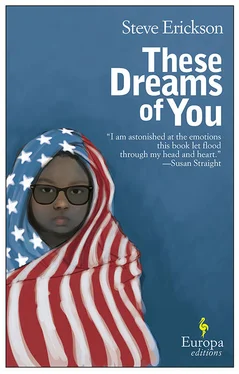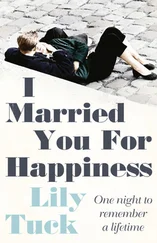The men sink into the anonymity they’ve craved in their ramble eastward. Turkish immigrants around them trudge westward, worlds passing at twilight, the visibility of each to the other dying at dusk. Session musicians come and go through the cavernous studio, a converted movie set from the silent era before the rise of the Reich where epic visions were filmed of sexy robots in Twenty-First Century Babels. The air fills with the chemical smell of old celluloid rotting in the vaults.
She’s never seen musical instruments that look like these. It’s as though they’ve materialized from the same silent science-fiction German movies whose rot the musicians breathe in and out as they play; the instruments appear more like time machines, or what she imagines a time machine might look like, transporting the traveler from the execution of a song back to its inception or forward to its completion — bending the music from the end or beginning back into the middle, and bending the music of years from now back to the music of years ago, to produce this music of the moment. It’s as though Jasmine could climb into a song and ride it back ten years to the kitchen of an old Hollywood hotel, in time to prevent an assassination, or forward twenty years in time to prevent her own.
The first time that Jasmine sees the Professor, as everyone calls him, it’s the middle of a stormy afternoon. She’s arrived with recording contracts to be signed and finds him alone, hunched over one of the instruments in the barely lit studio; a tinny transistor plays a song from half a dozen years before— and Ray Charles was shot down —another musical age. He’s lost in thought, staring at the studio floor covered with a couple dozen cards that might be from a tarot except without images or icons. Rather they’re emblazoned with maxims and mini-manifestos that barely can be read in the room’s shadows: EMBARRASS YOURSELF and THE SONG HAS SECRETS FROM THE SINGER and DO NOT BE BLIND TO. . on one card and. . YOUR OWN VISION on the next. Alone, staring at the floor trying to divine its instructions, when the transistor sings I dreamed we played cards in the dark, and you lost and you lied , the balding man in eyeliner laughs and glances over his shoulder at the radio
these dreams of you. .
then looks up and smiles at Jasmine as though they’ve met many times. Over the days and weeks, sessions spill into other sessions, songs start out belonging to one man and end another’s. More often the music is of a no-man’s land like that which lies between the two western and eastern barricades that have come to constitute in the psyche of the world a single Wall.
It’s a music of breakdowns and blackouts and “futuristic rhythm and blues”—the singer with the red hair calls it — about lovers in the Wall’s shadow, and sons of the silent age and electric-blue rooms that no one leaves. “Fritz Lang’s Metropolis starring James Brown!” the singer tells Jasmine excitedly one evening; she’s actually come to find such grand pronouncements rather endearing. While she isn’t sure she fancies the music or understands it, she senses it’s not to be dismissed, though she’s not inclined to let him know that. In the Schöneberg flat, the nearby table is stacked with art catalogs, jagged little polemics on aesthetic theory, modern novels. “You’re really reading that, are you?” she says to him behind the thick paperback.
He shrugs, “I’m half Irish — me mum,” and laying the book on his lap says, “Do you worry, luv, whether every note of an Ornette Coleman piece has meaning?”
“Maybe I do,” she says, but she doesn’t really listen to Ornette Coleman.
“Of course you don’t. It’s simple, really, a very simple tale — man sets out on a twenty-four-hour walk looking for home and, riding a wave of notes, finds the New World. It’s a song we’ve all sung, haven’t we? In this case it’s Dublin but it could be Berlin or London or L.A.”
Whatever his faults, a lack of graciousness isn’t one, nor a lack of patience with anyone but himself, for whom he has none. “When Miles started doing funk-Stockhausen,” he tells her, “did someone say suspiciously, Gone all musique concrète on us then, have you?”
“Probably someone did,” she says, “or perhaps they just called it futuristic rhythm and blues.”
“Look, the whole century has been about black and white fucking,” and leaning in the doorway of his room she raises an eyebrow but he won’t back down. “Absolutely! I’ll bet,” he says of the novel, “Molly Bloom really is a black girl and he just doesn’t tell us. New York Jews like Gershwin, Kern, Arlen cumming southern Negro music while Duke Ellington ravishes Nineteenth Century Europeans like Debussy — rather the whole bloody point of it all, isn’t it?”
“Is it?”
“But of course,” he insists, “and I’m the new white Duke for the Old World in a new century, stealing the remains of black music and smashing it for good. Writing and singing it like a white limey, because what could survive that ? And I should bloody well hope some Yank spade out there is doing the same to the remains of white european music. To everything there’s a reaction. Anticipate the reaction .”
“That sounds like something from one of the Professor’s cards.”
“First rule of cultural warfare.”
“Perhaps you should just be the You for a new century.”
He waves this away like it’s the least sensible thing anyone has said in a while. “Oh but I learned long ago I’m not who I think I am, I’m who the public thinks I am or I’m not anyone, am I? I steal everything , don’t I? And someday, somebody shall steal me —put me in a movie or novel and,” he cackles maniacally, “I’ll be bloody indignant!” He says, “Tell me, luv, if I may ask. Where are your people from?”
“Ethiopia,” she says.
“Truly? That’s fantastic! Have you ever been?”
“I was two when my parents moved me and my brother to London. I went back for about a week, eight years ago.”
“Fantastic, fantastic,” he keeps muttering, “how perfect it is, then, that you’re from there and now you’re here.”
“Perfect?”
“Abyssinia! The beginning of time, Ethiopia, and L.A. is the end of time, and this,” Berlin at his fingertips, “is time in the crosshairs, where the latitudes intersect.”
“On what map?”
“Not any map you look at , Jasmine,” he says, “the map you hear. Come on, don’t you like me by now? A little?”
“I’ve actually come to quite like you.”
“There, you see? I’m so very, very glad to hear it,” he says so wholeheartedly that she can’t help being moved.
“You’re not a Nazi,” she points out.
“No. Thank you.” He picks up the thick novel again. “I’ll never live that down and,” he says quietly, “probably don’t deserve to.”
“Probably not.”
“Well, no more headline chasing for me, for a while. I’m laying low. An Old World man who plunged into the heart of the New and it almost destroyed him.” He tosses the paperback to her. “Try not worrying too much what the words mean. They’re just notes. It’s all really about the Old World discovering the New and waving goodbye to itself.”
Has he forgotten that on the opening blank page of the paperback he’s drawn a picture of her, one day as he sat in the recording studio gazing out the window at a couple by the Wall? He was a painter once, back before the music, before he concluded there was no future in painting. Or does he remember perfectly well and, very calculatedly, finds this an off-handed way of showing her? Whichever: Later when she opens the book she can see that the sketch on the inside is unmistakably her, in all her shades of brown but for the misplaced gray of her eyes.
Читать дальше











